Shadow Tactics: Blades of the Shogun
Shadow Tactics: Blades of the Shogun
Hidden obsession
Today I'm going to tell you the story of a young, handsome and extremely modest writer who, in his search for new, creative article forms, reached into the cliché box of storytelling and opted for the fairytale form. The subject of his latest review was to be Shadow Tactics: Blades of the Shogun a game that had already seen the light of day in 2016. The scribe was always a little late with his reviews because he was too cheap to fully compensate developers for their work and didn't expect anyone to read his writing anyway. But this time it was different. A friendly spirit had told him about this little masterpiece early on and the scribe knew that the spirit would be harsh with his own words if he did the game an injustice. That's why the scribe decided to judge the game, which could be described as a stealth-focused real-time tactics game, very carefully and justly. In this work, its developer Mimimi Games had adapted the gameplay familiar from Commandos and Desperados to feudal Japan and proved that the formula could be fun in any era.
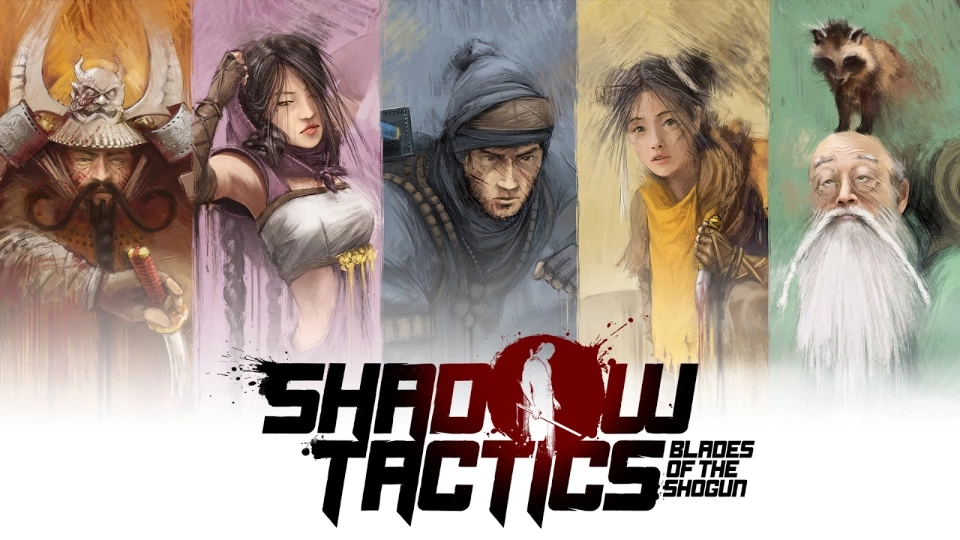
For his review, the scribe sat down at the computer for several days and snuck, assassinated and puzzled his way through the 13 missions. Of course, he didn't do this himself, but used the characters and their different abilities, which he had to combine skillfully in order to get closer to the mission objectives. He controlled his companions from the familiar isometric bird's eye view, which he could rotate freely to view the expansive maps from all angles.
But wait, I'm getting ahead of myself! The scribe would surely want me to explain what the game is about first. Its story - in contrast to that of the scribe - takes place in Japan during the Edo period, i.e. between the 17th and 19th centuries. In the game, the scribe controls the destinies of five protagonists, who find themselves in a conflict between the ruling shogun and rebels on the side of the head of state. Under the command of the author, these five heroes steal important documents, kidnap or eliminate rebellious personalities or break out of prison. These heroes are Hayato, the a-typcial equipped with a shuriken and katana, who light-footedly sweeps enemies into the afterlife; the samurai Mugen, a muscular close combat specialist who is the only one who can take on enemy samurais and carry several dead enemies at once; the thief Yuki, who lures inquisitive guards into her traps with her flute; disguise artist Aiko, who attracts attention with her various appearances and allows the others to sneak past; and Takuma, the wise old sniper who takes out enemies at a distance and whose pet-tanuki Kuma attracts the attention of bystanders.
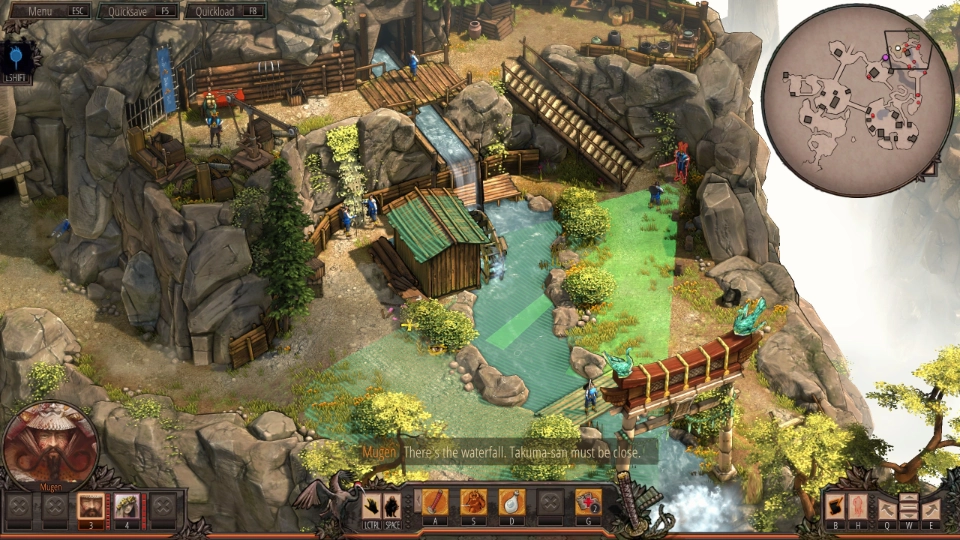
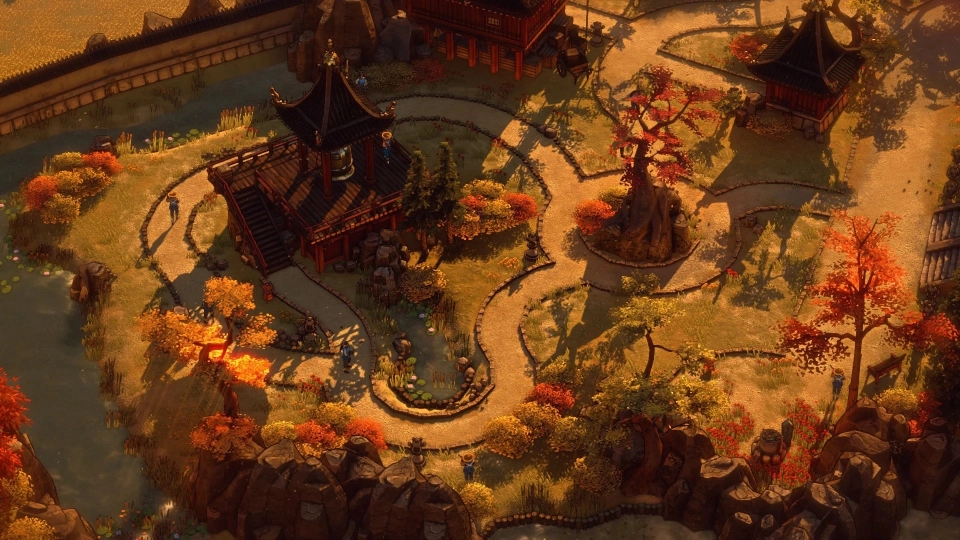
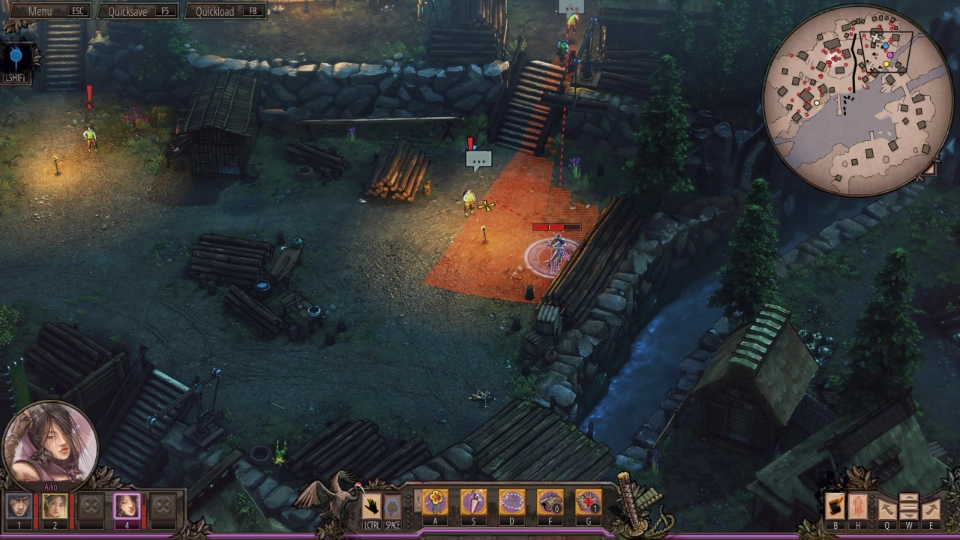
The story of Shadow Tactics is predictable, but still manages to create a bond with the “Blades of the Shogun” and logically link their motivations. This emotional wooing leaves the player with the feeling that the friendship was well deserved. At this point, the scribe briefly recalled Sniper: Ghost Warrior Contracts and had to shudder. He thought about how two games had managed to be so fundamentally different, even though they had the same core theme: discreetness. But then he also realized that Valiant Hearts and Call of Duty were generally about war, and it was hardly possible to compare the two. So he quickly dismissed the idea and remembered his task of praising Shadow Tactics: Blades of the Shogun.
So after considering the interesting story and well-written characters, he turned to the next big review block: gameplay. The young scribe was familiar with this from his youth, when he had spent days and nights meticulously beating Nazis unconscious behind enemy lines in Commandos 2: Men of Courage with his squad of special Allied soldiers. Beaten, because back then he didn't want to kill anyone, which is why many passages had evidently cost him lots of follicles. He was able to transfer his experiences from those days almost one-to-one to Shadow Tactics which was so frighteningly similar to its spiritual predecessor in many respects that its gameplay immediately captivated the young scribe. He sent his characters to a location by simply left-clicking, while double-clicking sent them sprinting across the map. By right-clicking, however, he could display the enemies' field of vision and the effects of obstacles. He enjoyed working his way from cover to cover, from enemy to enemy, like solving a big puzzle. Unlike back then, however, this time he used the many different abilities of his characters, which made the puzzle much more exciting than relying on his bare fist.
For example, he often used Hayato's stone throw, which caused enemies to look in a different direction for a short time so that he could dart past them undetected or take them out with a shuriken star and the katana. Another favorite tactic of the young scribe was Mugen's sake bottle, which attracted enemies - often in combination with Yuki's trap. What often made his missions almost too easy, however, was the furry beast Kuma, which attracted opponents in a radius and locked their gaze. The young scribe noticed that the animal worked a little too well, as the enemies lost interest in it at some point, but not if it was moved briefly and then used to attract the enemies again. In fact, enemies could be navigated over long distances in this way without having to put oneself in danger. The young scribe therefore wondered whether this had been planned by the developers or whether he had cheated the game with nasty tricks.
This also clearly revealed the lack of intelligence of the artificial enemies, who were happy to ignore deafening shots, death screams or even explosions, even if they were only a few meters away. And then the young scribe remembered Sniper: Ghost Warrior Contracts which tried so desperately to be realistic, while Shadow Tactics was simply a little puzzle game with a focus on fun rather than realism. And he was pleased that he had noticed this parallel, because he had lost disgracefully at the pub quiz only days before and had fallen into a deep valley of self-doubt.
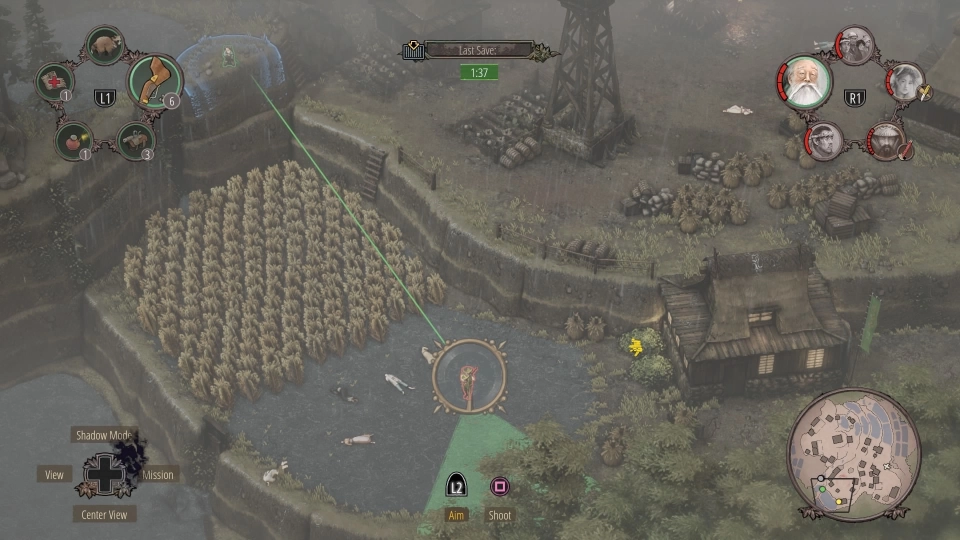
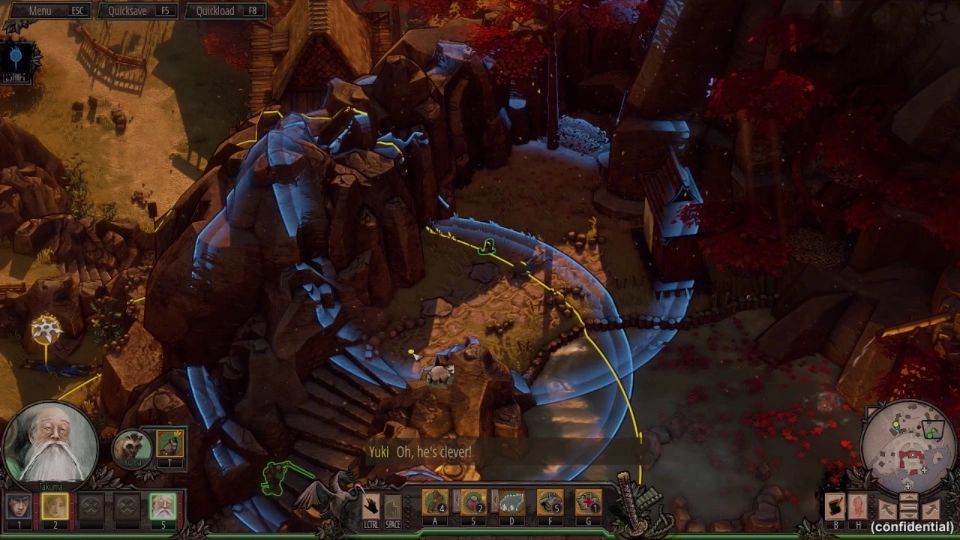
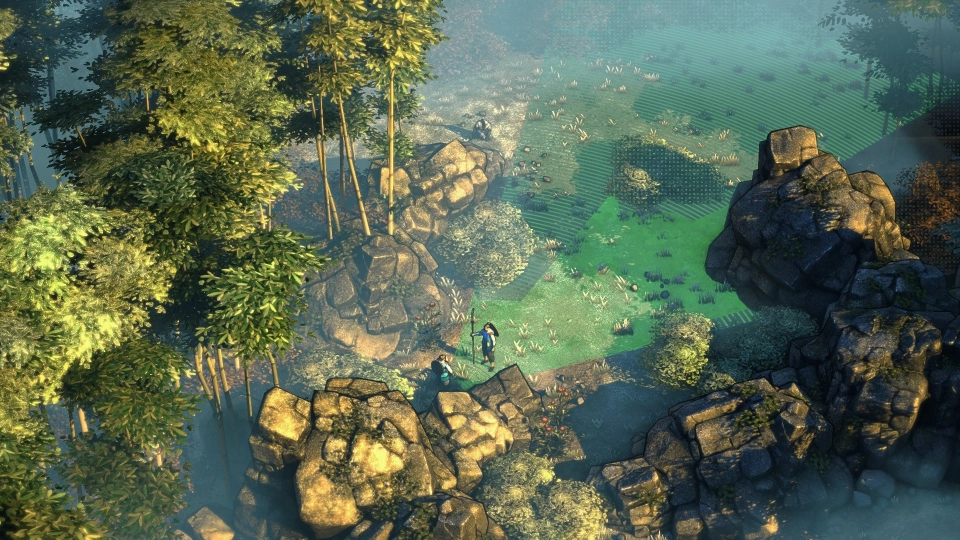
In this respect, Shadow Tactics had remained faithful to its ancestor Commandos . However, the developers had used the 15 years that lay between the scribes two gaming experiences to come up with countless quality of life features that made sneaking much more enjoyable. The biggest and most important one for him was the quick save function. Although this had already existed in 2001, the save status was overwritten every time. Shadow Tactics on the other hand, distributed the scribe's progress over three separate save games, which meant that a premature or incorrect press of F5 did not immediately result in a restart, but the young scribe could easily load the previous quick save to undo the mistake. The game also showed him if he had not saved for a long time. After just one minute, the message “last saved 1:00 min ago” flashed up, preventing him from having to involuntarily replay longer sections. But he did it anyway, because the game often offered him different options for overcoming a problem through its many possible solutions, which he tried out to get the best result. And because he failed several times. Sometimes he got a time window wrong, sometimes a dead body was discovered too early, and sometimes the ninjas simply wouldn't do what he asked of them.
This rebelliousness was particularly noticeable to him when jumping from elevations and throwing corpses into chasms. All too often, the women and men refused to serve him and were spotted by the enemy because he was simply not shown the right option. Rotating the view or moving the mouse over every possible or impossible point on the stone wall in the hope that it would work didn't help. But this was actually the only point of criticism that Shadow Tactics left him with. The Shadow mode, in which he could assign a command to each character and have it executed simultaneously at the touch of a button, had allowed him to perform one or two maneuvers that made him sink into his seat like a master strategist and laugh to himself at the success of the action.
The story had entertained him comparatively well for a game of this genre, the animations and graphics in the cell-shaded style looked quite respectable from a distance, the music was fitting and the many additional challenges and badges meant that he was driven by the desire to collect and replay many of the missions. The different difficulty levels also allowed him to make the experience more challenging, but not more unfair, as there was usually always enough time to eliminate the alerted enemies. And if he didn't care whether he arrived at the mission objective without raising the alarm or whether his 'blades' arrived unharmed, he simply let them rush past the opponents or knock them down on the way.
The young scribe was pleased that Shadow Tactics often offered him a helping hand, but never forced him to play in a certain way. Whether he took out all or none of the guards, explored the map from the right or left first, used every one of his characters or just a few. Instead, he always had the feeling that he could solve the situation in a different way; and for him, that was the heart of a good puzzle game. Even if he wasn't a fan of the Far East, the -Chan and -San, the obsession with tradition and the small number of enemy types, the developer had managed to give him a game that he would remember positively and that made his longing for the good old Commandos fade away.
And so ends the story of the young scribe, who had finally devoured another good sneaking game for a long time and was now able to devote himself to his other hobby, soundtracks.

Bottom line
Shadow Tactics: Blades of the Shogun is a stealth puzzle game that knows exactly what it wants to be – and remains remarkably consistent in this regard. The story is predictable but coherently told, the characters grow on you over the course of the missions, and feudal Japan serves less as an exotic backdrop than as a functional playing field for tactical thinking. Particularly strong is the interplay between the five heroes, whose abilities complement each other well and constantly open up new solutions. The game rarely feels unfair, but instead demands planning, timing, and creativity – rewarding these with an almost addictive flow of observation, trial and error, and perfection.
In terms of gameplay, Shadow Tactics deliberately remains a puzzle and not an experiment in realism. The AI is predictable, convenience features such as generous quick saves take the edge off frustration, and Shadow Mode allows for those satisfying moments when everything comes together at once. Minor weaknesses such as jerky jumping and throwing actions hardly detract from the overall picture. What is more important is the feeling of being able to proceed differently at any time – a rare quality feature. Even those who struggle with the setting or genre will find a focused, well-thought-out stealth game that modernizes classic role models without blindly emulating them.
